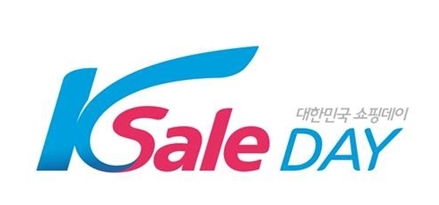Encouraged by the record-breaking success of Korean manufacturers and retailers in China’s Singles Day event on Nov. 11, Korea is once again reviving its Korea’s Black Friday event in its efforts to boost domestic consumption.
This time, retailers are striving to lure global shoppers hopping around sales promotions around the world ranging from Singles’ Day to the U.S.’ Black Friday Event and then to the K-Sale Day, which is slated for Nov. 20-Dec. 15 in Korea.
 |
| The logo of the K-Sale event, scheduled for Nov. 20-Dec. 15 in Korea (MOTIE) |
“The K-Sale will be led by the retailers and manufacturers, rather than the government. The event was based on the desperation to revive the consumption sentiment, set fire by the Korea’s Black Friday that took place on Oct. 1-15. We are also impressed with the Singles’ Day record,” a member of the federation of distribution industry said Friday as signing a memorandum of understanding with the Industry Ministry and fellow retailers in Seoul.
The store operators are hoping that global online shoppers will trot around their websites to spree extra cash, just as what happened during the Singles’ Day event. The Chinese retailer Alibaba-led event generated 16.5 trillion won worth-sales in 24 hours, creating 460 million cases of delivery, creating 100,000 temporary jobs.
And during this very event, Korean retailers have taken full advantage of the hallyu, or Korean culture boom, there, seeing tens of billions of won in sales overnight.
According to ICB, one of Alibaba’s Korean logistics partners, said Korean businessmen at TMall, one of Alibaba’s online shopping malls, received 500,000 cases of order on a single day.
The largest beneficiary was the E-Land Group, whose fashion and dining brands are widely popular in China. The company generated 175 million yuan ($27.5 million) in sales on Wednesday, mostly in the fashion sector.
Some of the best-selling items were cosmetics. The BB cushion set and Pure White cream set by Mamonde, an AmorePacific brand, sold out while LG Household & Health Care said its shampoo brand Rien saw the sales jump by sevenfold compared to last year.
But other household goods were on fire, too. Lock & Lock, a food container-maker, sold 4.7 billion won in dishes while Hurome juicers were sold every two seconds during the highly publicized sales event.
“We are hoping that the growing portion of foreign shoppers to participate and spend on Korean products at a bargain because, to be honest, whether K-Sale event itself could generate extra profit from domestic consumers is highly dubious,” a spokesman for a local retail outlet admitted.
“We already have annual sale event and more to come, and the constant sale event will drive consumers to open their wallets only during the discount promotion period, which could be detrimental to the business in the bigger picture,” he added.
According to the Industry Ministry’s report the Korea’s Black Friday event held on Oct. 1-15 propelled the retailers’ sales by 20.7 percent, with the Composite Consumer Sentiment Index showing slight increase by 0.2 percentage point. The number of foreign shoppers also rose by 8.5 percent during the period.
By Bae Ji-sook (baejisook@heraldcorp.com)



